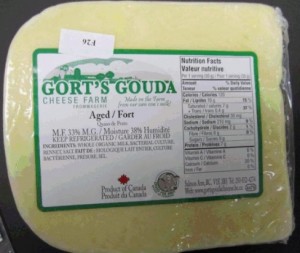An E.coli outbreak linked to raw milk cheese, killed one person and sickened 27 others in Canada, one year ago. One of the four people who were hospitalized developed hemolytic uremic syndrome (HUS), a complication of some E.coli infections that leads to kidney failure.
 The patients, who ranged in age from 3 to 82 were from five provinces: 13 in British Columbia, 10 in Alberta, 2 in Saskatchewan, 2 in Manitoba and 1 in Quebec. The fatality was in British Columbia.
The patients, who ranged in age from 3 to 82 were from five provinces: 13 in British Columbia, 10 in Alberta, 2 in Saskatchewan, 2 in Manitoba and 1 in Quebec. The fatality was in British Columbia.
The outbreak triggered a recall of Gort’s Gouda cheese which was unpasteurized. The sale of unpasteurized cheese is legal in Canada, but the sale or unpasteurized or raw milk is not. Canadian health officials believe that while raw milk can contain dangerous bacteria such as E.coli, Listeria and Salmonella, cheese made from raw milk is generally made in such a way that helps to eliminate pathogens. Still, they-like American public authorities, say children, seniors, pregnant women and those with compromised immune systems should not drink raw milk or eat raw cheese as they are at greater risk for serious complications from food poisoning.
Symptoms of E.coli poisoning include diarrhea that can be bloody, abdominal cramping, vomiting and fever. A sick child who goes 12 hours without urination should see a doctor right away.
In the U.S., two E.coli outbreaks on opposite ends of the country have targeted children. Three children in Oregon developed HUS at the beginning of September. One of them, a 4-year-old girl, has died. Another remains hospitalized on dialysis, a third was released after a weeklong hospital stay that included five blood transfusions.
In Kentucky, six children have been diagnosed with E.coli. Four of them have HUS. Health authorities have, so far, been unable to determine the source of either outbreak




